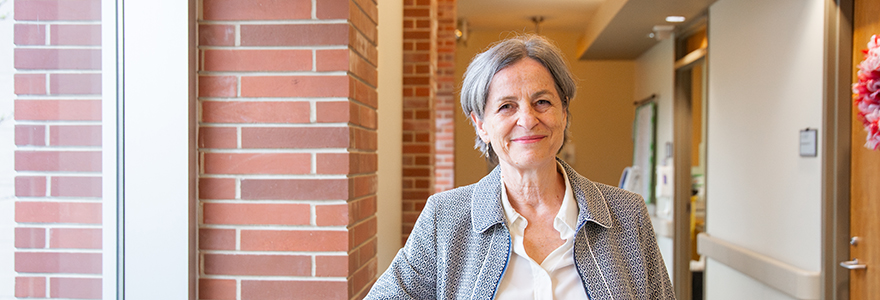Funding will help expand program, improve recruitment to critical cancer trials

By Cam Buchan
It’s a promising therapy for a particular group of cancer patients. But because of difficulties in recruiting patients into the program to test the new drug, the trial has to be cancelled.
The result? A therapy with the potential to help and heal cancer patients may not be available when and where it’s needed.
This scenario happens all too frequently, said Dr. Caroline Hamm, Chair, Windsor Oncology, associate professor at Schulich School of Medicine & Dentistry and clinical professor, University of Windsor.
Hamm said that a large percentage of clinical trials aren’t completed and lack of participants is one of the main challenges.
“There is a severe financial burden of starting up a trial and not finishing it,” she said. “If you start a trial and don’t finish it, you’ve just wasted all that money.”
There is also a delay in finding the answers to the questions the trial was meant solve.
“Either the drug works or it doesn’t work, but at least you know. And that gets translated into the health-care system,” said Hamm. “Patients put their lives on the line to complete a trial and when it doesn’t get finished, then their participation has no meaning.”
Launched in 2019 at Windsor Regional Hospital (WRH), the CTN platform helps connect cancer patients in smaller centres with critical and potentially live-saving clinical trials and expands the potential recruitment pool for physicians running trials. It’s a unique collaboration between Schulich Medicine & Dentistry, the University of Windsor, and WE-SPARK Health Institute.
Of the total 302 patients enrolled in the program since its launch, 24 per cent were referred to an interventional clinical trial and eight per cent were enrolled.
Hamm hopes to improve those numbers.
She recently received $198,825 in Canadian Institutes of Health Research (CIHR) funding to pilot the Windsor-based Clinical Trials Navigator (CTN) program in Winnipeg and Thunder Bay.
“Part of the problem is the silo effect of researchers running clinical trials in their own site and not connecting with other sites. There’s no organization that brings all clinical trial sites together and tries to get the right patients into these trials. That’s the part of the problem we’re trying to solve.”
At the same time, patients lack the expertise to search for the appropriate trial, physicians lack the time to search for trials outside of their centre, and there are no other dedicated personnel for this endeavor.
“We will embed a clinical trials navigator associate into each site, and gather the critical information required to participate effectively in a trial,” said Hamm. “These navigator associates will be able to gather the information quickly and efficiently from patient charts because they are part of the cancer program in these centres.”
It’s a way to fix a sysytem that is fractured, even broken, said Hamm.
“Improvement in clinical trials accrual has the potential to positively impact the entire ecosystem of clinical trials. Successful and timely completion of enrolment will save the health-care system significant costs, bring new treatments to clinical practice faster and improve patient survival and quality of life.”








